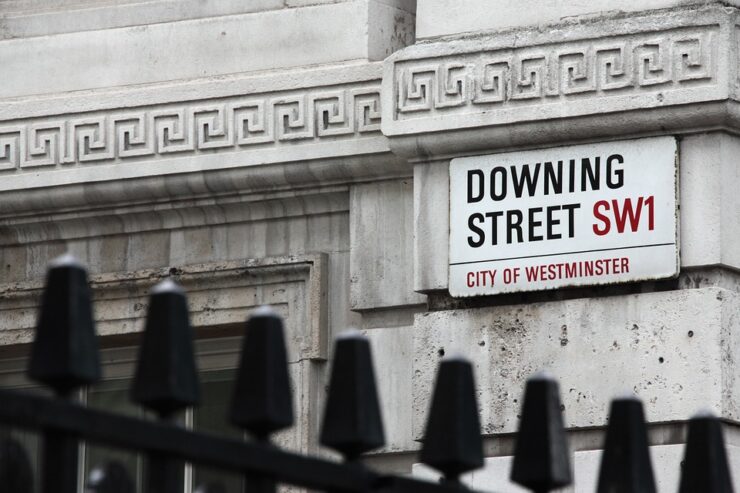With the announcement of a 2017 snap general election on the 18th of April, a large amount of the electorate were looking at the party manifestos and deciding what policies were going to have the biggest impact on their lives. How was what was on offer going to affect them?
With that in mind, Last Minute Musicians created a survey of professional musicians, in order to gauge their political beliefs and raise the profile of political issues that will affect them.
Exactly 200 industry professionals responded, answering two questions on who they plan to vote for and why.
Some of the responses could be described as expected – topical subjects that are often on the news and discussed in parliament. However, there were plenty of other issues raised that went beyond the obvious, speaking to both deeply held values and real concerns.
How the survey was conducted
Participants were asked two questions. An email address was required, and no device or address was allowed to take the survey more than once.
Every attempt was made to keep this survey free from bias, both in the way the questions were presented and the way in which the survey was promoted.
Question 1: Which UK political party do you feel currently best represents the interests of professional musicians and those working in the music industry and music education? Please answer by selecting one of the following options from the list of all political parties represented in parliament after the 2015 general election. Please only answer if you would identify yourself as a professional musician, working in the music industry or music education.
Question 1 Results
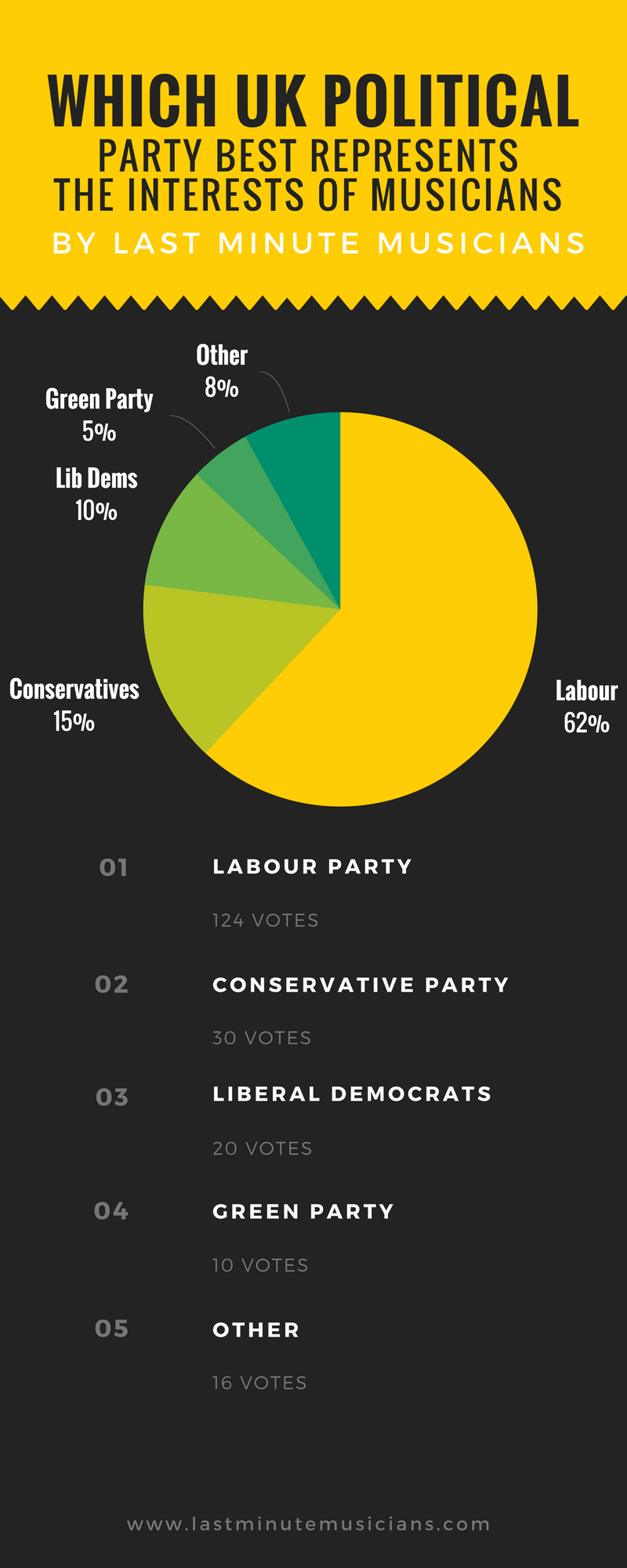
Full breakdown of results
- Labour Party – 124 votes
- Conservative Party – 30 votes
- Liberal Democrats – 20 votes
- Green Party – 10 votes
- Independent (Please specify below) – 9 votes
- UK Independence Party – 3 votes
- Scottish National Party – 1 vote
- Plaid Cymru – 1 vote
- Co-operative Party – 1 vote
- Sinn Féin – 1 vote
- Social Democratic and Labour Party – 0 votes
- Ulster Unionist Party – 0 votes
- Democratic Unionist Party – 0 votes
What we can learn from these results
The most obvious impression to get from the votes cast in this survey is that most musician’s political beliefs tend to fall to the political left-of-center rather the right, with the Labour party receiving the most votes by a considerable number.
There are several theories for this – It wouldn’t be unfair to say (on both sides of the Atlantic) a lot of artists and creative-types have traditionally seemed to land on the left. Most recently, you’ve seen many high profile artists such as Katy Perry, Lady Gaga and Bruce Springsteen voice their support for Democratic party candidate Hillary Clinton in the US 2016 election.
In the UK, Jeremy Corbyn (The Labour party’s former leader) has made a speech opening for indie-rock band The Liberteens, and (though the appearance was cancelled) was due to appear at Glastonbury last year.
While there is still potential for huge success, wealth and fame in the music industry, it is underpinned by strong roots in the working class.
The age old story of bands coming up through hardship and poverty, working incredibly hard to eventually reap the fruits of their labour is a common one amongst successful musicians, which could also speak to the result. However from the votes alone, all of these theories are hard to substantiate, hence the need for question 2.
The Musicians Union also has strong links to the Labour Party, trying to promote many traditional left-wing values such as workers rights, legal representation and fairer pay.
One other thing to note is the not-inconsiderable amount of votes for smaller parties. While the Liberal Democrats held just 9 seats out of the 650 available in parliament at the time of the survey, they managed to come a solid 3rd place, with 10% of the votes – just 5% behind the conservatives, the current government.
In fact, with the votes for the Green party and the Lib Dems combined, they hold exactly the same vote share as the Conservatives (a much larger party).
Question 2 results: specific issues raised
One of the most important and positive aspects of carrying out this survey was gaining specific insight into the issues that professional musicians (and others that work in the industry) consider to be most important to them.
The following is a summary of the most popular policies and concerns, with some direct quotes from survey participants. Anything added for context will be clearly marked [ ].
Arts funding

Perhaps unsurprisingly, arts funding was a major issue for a lot of respondents. On the whole, Labour received a great deal of credit for their policies on investment in the arts, with participants often talking about the importance Jeremy Corbyn places on the subject.
The Conservatives took a lot of criticism for the manor in which they have treated funding for the arts while in government. Responses to question 2 included:
[Labour will put] More investment in the arts. Reversing cuts to the Arts. Greater value placed on the Arts in general. Jeremy Corbyn has spoken about the value of the Arts in society. I firmly believe he is the greatest hope we have for our Arts sector to survive in this country.
See [Labour’s] up-to-date/2017 arts policy. It all benefits the UK music community!!
More funding for the arts and giving grassroot musicians and more facilities to hone their skills.”
Brexit

Again, perhaps unsurprisingly given how contentious the issue is, Brexit made a strong appearance in the answers to question 2.
Generally, those who answered Liberal Democrat to question 1 raised this issue (as well as featuring in the answers for the small amount of UKIP supporters). Answers for why they felt the Lib Dems were best placed to support the UK music community included:
Their Policy on Brexit in offering a second meaningful vote. Brexit will be a disaster for musicians touring in Europe, both logistically and culturally, risking our links with our european partners and friends
[Lib Dems] Commitment to stay in Europe/ gain borderless, visaless access. Leaving the EU will be catastrophic for music.
Free moment in Europe, keeping cost for U.K. orchestral tours low. [answered Lib Dem]
Staying in the single market and offering a second referendum on any deal to leave the EU. EU membership is essential for my work as a musician because I perform in Europe and work with EU nationals in the UK whose skills are not replicable by UK nationals. [answered Lib Dem]
I believe that the Liberal Democrat’s policy of challenging the terms of a ‘hard Brexit’ will give the UK the best chance of remaining a part of the single market and other trade agreements, which will in turn provide the U.K. with the best economic outcome. This will only benefit the music industry!
Management of the NHS

Something that had a particularly strong showing was how political parties intend to treat the National Health Service.
A lot of musicians were concerned that, should our healthcare system move towards a private insurance scheme, healthcare would become completely unaffordable to most professional musicians.
With their policies for large-scale investment into the NHS, Labour were generally the most popular choice of political party for those concerned about the NHS. Most views expressed were similar to the following;
Most pro musicians can’t afford private healthcare so would be in trouble without the NHS. Brexit won’t help us with work in Europe. I think the best option for all non-millionaires (musician or otherwise) is to vote Labour, even if it’s only a tactical vote to stop the Conservatives getting back in!
Fairer approach with more support to essential services such as the NHS that may be needed by professional musicians without access to private healthcare.”
State of the economy
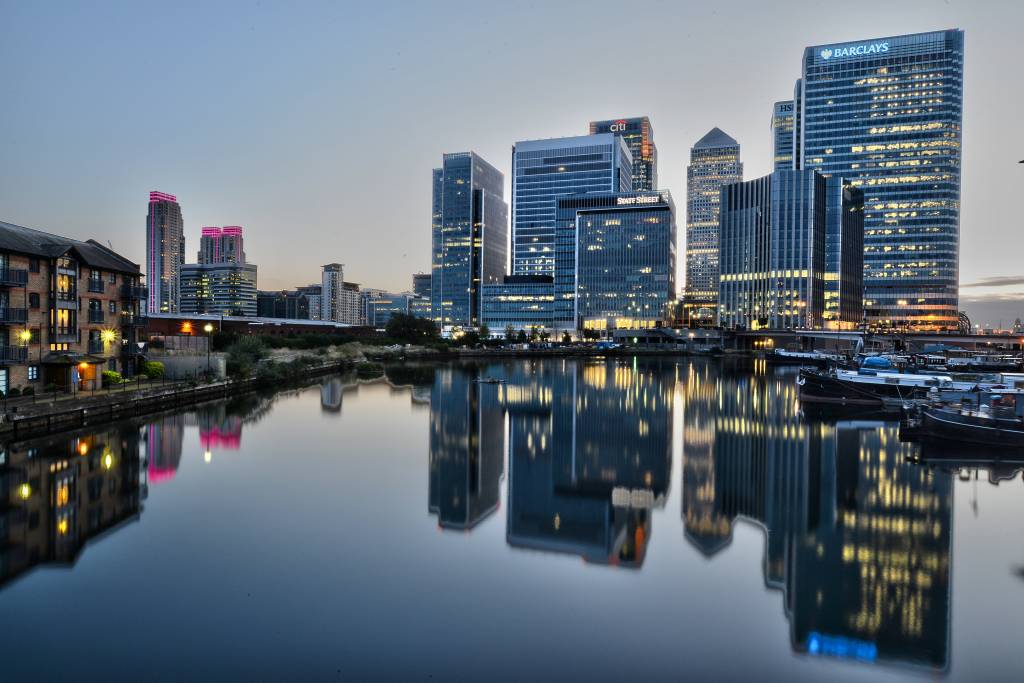
This was undoubtedly the main area of concern for anyone that answered Conservative to question 1.
Virtually every musician who said they were voting Conservative answered question 2 by making reference to the economy in some way. Answers included:
I am a Tory and am confident that they represent most professions in one way or another. A stable economy engenders confidence in the Country and wealth is proportionally spread.
They [Conservatives] encourage business and provide a secure economic climate to operate in.
Everyone in this country, whether they are a musician or work in any other industry, suffer if the UK’s economy as a whole is run badly. The Conservatives are far and away the only party with the ability to manage and grow the economy. The Conservatives have always been the champions of people who want to work hard, and especially those who may be self employed as many musicians are. Labour can barely scrape together a shadow cabinet who can stand to be in the same room with each other, and don’t even have the simple ability to launch the few policies they do have without humiliating themselves. It would be quite a stretch to think they could run our county.
Creating a good economy for our clients to be successful – then they book musicians. Control immigration to stop the UK music market being flooded with too many players from abroad which forces prices downwards.
Support for the self-employed, tax & workers rights
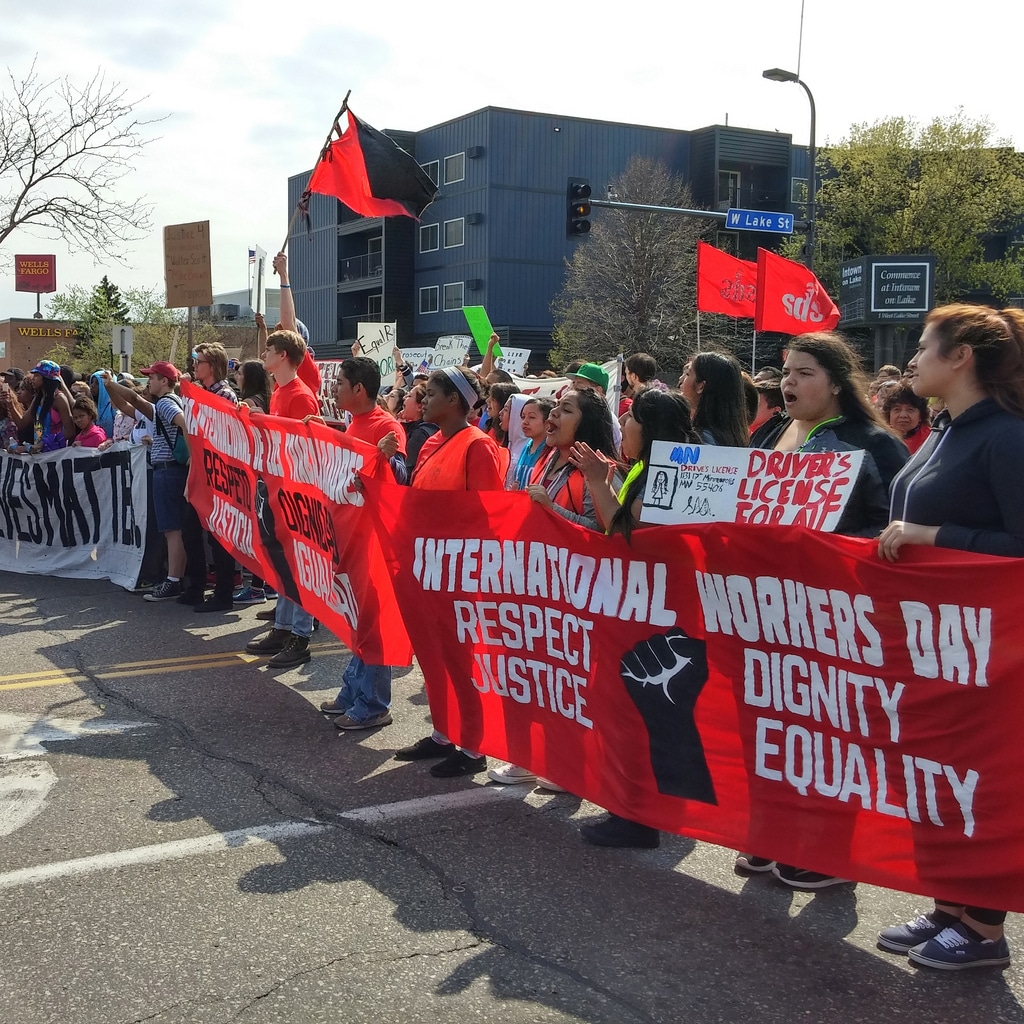
With the majority of musicians being self employed, a lot of respondents to the survey put significant value on how a future government would treat the self-employed and workers rights.
Tax fairness was also an issue raised more than once. On the whole, Labour’s plans to tackle wealth inequality seemed popular with those who answered the survey, with responses like:
They [Labour] have fairer, more realistic views on income tax…allowing working musicians to keep more of their earnings.
Most musicians are struggling with their work and trying to monetise their craft. This also involves working multiple jobs or becoming self employed. Under a certain wage musicians may need a hand here and there. Labour seem to have that covered. Labour also funded more art and music based initiatives at my school that aided in my development and others. Also further financial and societal help for the poor will enable them to begin participating in more cultural and artistic events which is not as possible in poverty as musical instruments/tuition/venues etc. are not cheap for anyone.
…Not only this, but Labour also want to enshrine into law a minimum standard of pay and working conditions for all musicians – something we have been demanding for years. The Conservatives, luckily, backtracked on their 10% NI hike on the self-employed, largely thanks to Labour pressure, and under Corbyn, Labour would do a lot more to help the self-employed. Obviously for musicians, this is very important, as the vast majority of us are self-employed.
However, the Conservatives did also have a showing:
[Conservatives are the] Most likely to appreciate the efforts of those who, by their own endeavours and business acumen – achieve success, and indeed – provide income for their family by their own efforts – that is – by large – musicians are self employed
We are self employed and I believe that if I make enough money that yes I could contribute to the development of society but since I have worked for it I should keep the majority. Anyway there are a lot of left individual managing the grants system and if you don’t fit you don’t get that is why
Rent & housing

Perhaps surprisingly, housing was not an issue that received lots of individual comments. It instead tended to be additional point tagged on to another issue, for example:
[Labour’s plans to] Abolishing tuition fees and reintroducing grants, so young musicians can graduate and compete in todays industry without £40,000 of debt. Also, the cap on inflation rises for rent – all the musicians I know rent, and could do with some stability in pricing, so they aren’t forced to move from one area to another every year.
Education investment
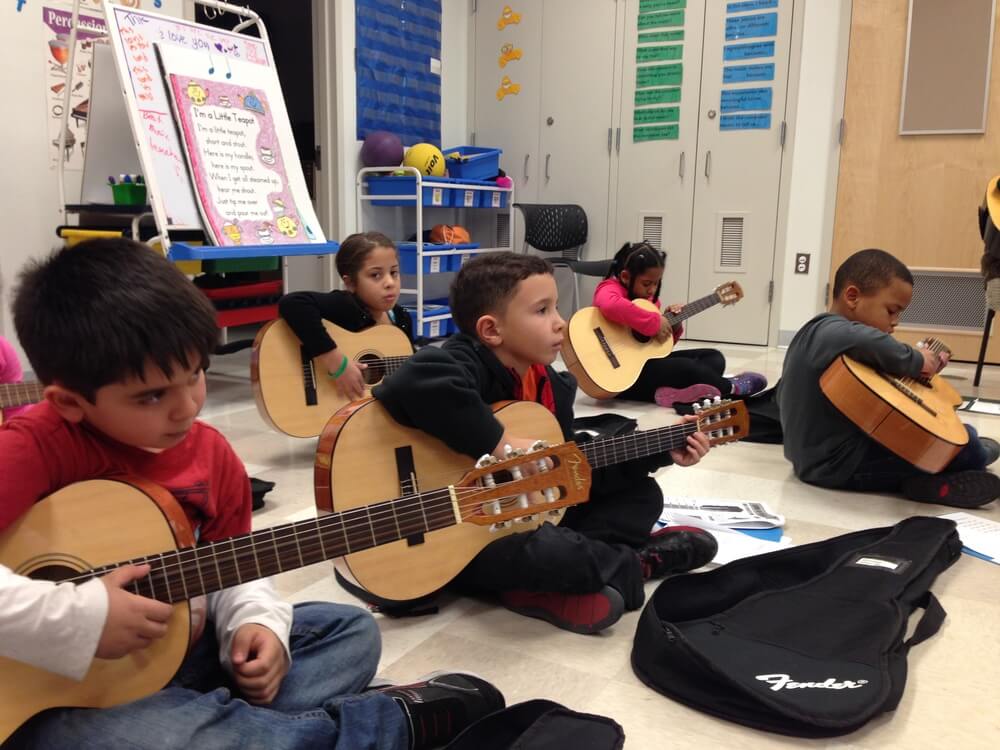
When this issue was raised, it often saw the longest responses given by any of the participants.
This could probably be viewed as one of the Labour Party’s most popular policies with professional musicians, as the vast majority who raised this issue were planning to vote Labour. Answers included:
Firstly, Labour are the only main party who are committed to increasing government funding for the arts. Whilst the Conservatives and many other parties are for the opposite. This would increase access to music for many people and bring the level of funding back up to the European average (currently it is way below the average). Jeremy Corbyn has even said that Labour would introduce a special government department to deal with arts and creative industries, a big step forward for budding aspirational professional musicians…
The cuts to education have had a devastating effect on children’s musical education in state schools. Music lessons have now become a privilege of the elite. The present Government have not invested in the arts or in music education. Labour want to invest in schools and I know that they are far more supportive of the arts. Music starts at Primary level and every child deserves an opportunity to learn an instrument for free. Music is a fundamental part of a child’s education and yet the present Government cuts have forced schools to make a choice between the ‘academic’ subjects and music lessons which are see as less of a priority. There are a growing number of secondary schools who do not offer music as an option.
The cuts, that are inevitable if the torys get in again, to schools will significantly reduce funding to extra curricular activities such as music based club. I believe hold heartedly Jeremy Corbyn will provide a financially stable and prosperous education system, Were no matter what a child has the opportunity to learn music, language and many other valued skills throughout life. I also think that university fees being abolished is a tremendous step to a brighter and fairer world to all young people who wish to go and study music and thrive in the opportunity given to them
For me, there are a few factors of Labour’s policies which I think will affect the music community. First off, making higher education free. There are some musicians who would really benefit from the networking element, not to mention the education from going to university, and there are so many who choose not to because of debt. Labour also has a strong emphasis on creativity in the classrooms, which at the moment is lost in exchange for exam results. Labour also wants to plug more funding in to the Arts.
If you are concerned about any of the issues raised, and want to promote the discussion of policies that you feel will help or hinder the UK Music community, then we encourage you to share this blog post on all social media platforms.
Share this:

